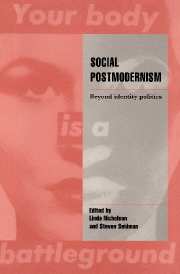Book contents
- Frontmatter
- Contents
- Notes on contributors
- Acknowledgements
- Introduction
- Part I Critiques of identity
- Part II Critiques of the deconstruction of identity
- Part III Postmodern approaches to the social
- Part IV Postmodern approaches to the political
- 11 Feminism, citizenship, and radical democratic politics
- 12 The space of justice: lesbians and democratic politics
- 13 Against the liberal state: ACT-UP and the emergence of postmodern politics
14 - Democracies of pleasure: thoughts on the goals of radical sexual politics
Published online by Cambridge University Press: 29 October 2009
- Frontmatter
- Contents
- Notes on contributors
- Acknowledgements
- Introduction
- Part I Critiques of identity
- Part II Critiques of the deconstruction of identity
- Part III Postmodern approaches to the social
- Part IV Postmodern approaches to the political
- 11 Feminism, citizenship, and radical democratic politics
- 12 The space of justice: lesbians and democratic politics
- 13 Against the liberal state: ACT-UP and the emergence of postmodern politics
Summary
Sexual liberation
The idea of sexual liberation that emerged from the new left of the 1960s (with sources going back to avant-garde intellectuals at the turn of the century) has been heavily criticized, sometimes for good reasons and sometimes for bad. It has, however, continued to influence the radical politics and social movements that have emerged since: women's liberation, gay liberation, a variety of countercultural and youth movements, the movement for “safe sex” in response to AIDS, queer politics, and others. As Marcuse (1969) suggested a quarter-century ago, these issues are a measure of the depth of the radical project.
Some currents of radicalism have remained in the trap into which Marcuse's own theorizing fell, a trap contained even in the language of “sexual liberation.” Marcuse was seduced by Freud's scientific poetry, by the reification of desire in psychoanalytic theory. (“The id” in English translations is “das Es” in German, literally “the it,” virtually The Thing from the Black Lagoon of the unconscious. One imagines the Instincts writhing and weaving in the depths, wailing to be free.)
Sartre's (1958) critique of the reification of libido in psychoanalytic theory is devastating. The conception of libido in need of release is based on a category-mistake about human action. We act sexually, we become sexual, but we are not constituted from the start as sexual beings. We are not driven, and we cannot act so as to liberate what is in process of being constituted. The goal of radical politics, therefore, cannot be the “liberation of sexuality” from social constraint. We can no more liberate libido than we can liberate the square root of minus one.
- Type
- Chapter
- Information
- Social PostmodernismBeyond Identity Politics, pp. 384 - 397Publisher: Cambridge University PressPrint publication year: 1995
- 3
- Cited by

